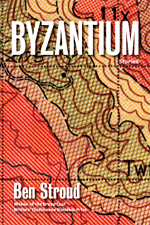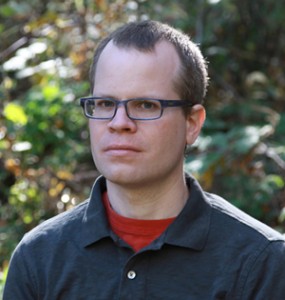Byzantium: Stories
Ben Stroud on getting to know a character, the balance between research and imagination, and the writer’s desire for recognition
Ben Stroud’s debut collection, Byzantium: Stories, was published last week by Graywolf Press, the product of a manuscript that was awarded the 2012 Bakeless Prize for fiction. Among the stories in the book is “East Texas Lumber,” which originally appeared in the June issue of Harper’s Magazine, and which evinces a sharp yet sympathetic eye for human failure. In Byzantium, Stroud extends this same eye to personal and social subjects across millennia, telling stories that range from the violent political intrigue of the titular city to the half-hearted adultery committed by a Ph.D. student in modern-day Berlin. I put six questions to him about his collection, the morality of historical fiction, and the writer’s desire for recognition.
1. In “East Texas Lumber,” the protagonist, Brian, often alludes to Christianity, but in a manner more offhanded than reflective. For instance the office of his boss, who he calls the Prime Mover, is described as an “air-conditioned holy of holies,” and he casually notes the other characters’ church affiliations throughout — Baptist, Church of Christ, Grace Church, no church. Why did you choose to make Christianity such a prominent part of Brian’s internal landscape, without making it the subject of conscious reflection?
The religion first came in as a reflection of place. This, to me, is the way the Bible Belt works: just about everyone has a church, even if they barely go to it. To be unaffiliated, to not go to church (or to not at least have a church you would claim) marks you as strange and suspect. And, if you are of this place, knowing where other people go to church is an essential way of placing them in your universe. You don’t worry about it much beyond that — it’s just one detail in the way you perceive others. At least, this was true for me growing up in East Texas. So, basically, this is how my narrator, Brian, sees his world, but it’s something he gives little actual thought to. He doesn’t consider, too deeply, what doctrinal difference there might be here, nor what it means about his world that church identity is considered so essential and given.
But then the story started to do something. The bit about Mike as the Prime Mover came as I pushed on the language, tried to more fully articulate Brian’s voice and to find a better, stronger, fresher way of conveying the power Mike has over Brian. And then once the Prime Mover language showed up, I built on it a little, and it came to me that perhaps this story was trying to give an accounting of the universe and its workings. Sounds ridiculous, I know. But here Brian is, helpless before an indifferent world, subject to larger forces (the tornado, Mike), and all he can do is try to eke out a little happiness as he struggles. It’s a bleak view, but something seemed there, and I started liking these connections between Mike and a cold, punishing God. The language was leading me somewhere, so I figured I’d follow through, leave that trace in the story. I’m suspicious of a story that tries to offer an overarching message, and that’s not the goal here. But there is a point where you’ve been staring at the words and reworking them so long that you start to see connections and an order you never thought about, and then that becomes part of the story, too.
2. Two of your stories — “The Don’s Cinnamon” and “The Moor” — seem to be about the same semi-historical figure, Jackson Hieronymus Burke, but the narrative styles are radically different. “The Don’s Cinnamon” unfolds in close third person and takes colonial Havana as its “present,” while the narrator of “The Moor” seems almost like a biographer a century or two removed. What compelled you to return to this character? And what considerations led you to adopt such different styles in doing so?
In a couple of the early reviews of the book, the reviewers have suggested that there should be a Burke novel, and I just laugh madly. At least, on the inside. Here’s why: Burke first showed up, in 2007, as a character in the story that would later become “The Don’s Cinnamon.” I then turned that into a novella. And then I turned it into a novel. The novel had five parts, each a different case from a period in Burke’s career. I finished it in 2009, my agent sent it out, and no one wanted it. There were reasons. Looking back, the novel was fairly sloppy, and though that particular period of failure was a not-fun experience, it ended up being invaluable.
Shortly after the novel bellyflopped, I pulled out pieces of the Berlin section and a later section to make “The Moor.” Originally, the narrator of the Berlin section was a man named Uribe who had been the Watson to Burke’s Holmes in Havana. He ended up on the cutting room floor, but many of his reflections folded into a historical viewpoint, and so the voice shifted naturally to that.
About a year or so after “The Moor” came out I decided to give the same treatment to the opening section of the novel. I cut down what was a ninety-nine-page novella to the twenty pages of the “The Don’s Cinnamon.” The novella already had a close third POV, so I kept it that way. I wanted there to be an actual Burke case out there, so the reader could see him in action. And, as a writer, I hated the idea of that opening section going to waste.
The other parts of the novel are absolutely dead, though, and will never be resurrected. I’ve got no plans for a Burke novel, either. That all feels like salted earth at the moment.
From “At Boquillas”:
Standing in the kitchen, Josh had been looking at her, waiting for an answer to a question she hadn’t heard. She put away her meandering thoughts and asked him to repeat what he’d said. Because this too she’d learned from her parents’ marriage: that you can make a mistake and not know it for years and years. And even more terrifying, never learn what the mistake was, just feel its misery coming down on you for the remainder of your life. Sometimes her father claimed that marrying her mother was the mistake, other times it was letting her go. Mostly they didn’t discuss it.
3. When you find a person or a place you want to write about — Burke, for instance, or Byzantium — how do you go about getting to know your characters? Is this process different from what you do for stories that draw more on your own experiences, such as “East Texas Lumber” or “Amy”?
I’d have to say it’s mostly the same. For me, character seems to be the last thing I figure out in a story. In a sense, character is what I’m ultimately chasing, what I’m building the story to discover. Place and plot come early on, and I revise in an effort to find out who exactly these people are.
The process should be simpler for stories like “East Texas Lumber” or “Amy” — I spent a summer working at a lumber yard, and I taught for a year in Germany. But in many ways it’s harder. In both of those stories (and the others that hit closer to home) I had to deviate from my own experience to that of the characters, and that can be difficult. “East Texas Lumber” was especially challenging. I kept bending back to “how things were” versus how things are for this character. It took a lot of distance, and living through the 2011 Tuscaloosa tornado — a truly horrific event that I’m a little ashamed to bring up in connection with this story — before I figured “East Texas Lumber” out. “Amy” was a little different. Right away that narrator was distinct from me, doing things I wasn’t doing (i.e., my wife was with me in Germany and we had a happy time), but still I had to fight turning it purely into an expat romanticization or simple hey-isn’t-this-corner-of-Germany-cool story. And it took a long time before I figured out that narrator’s mixture of honesty and deludedness.
4. A professor once related to me that Joyce Carol Oates stopped reading a Life piece about the serial killer Charles Schmidt as soon as she knew she wanted to write about him, so that she wouldn’t feel confined by the facts of his story. How do you find a balance between gathering enough material to feel qualified to write about a particular place and time, and not gathering so much that it begins to be a burden on the imagination?
One way is that I mostly write about fictional people in out of the way times and places. This gives me a lot of freedom. I don’t have to worry so much about checking this and that box, or writing toward this or that event that everyone is expecting. For instance, the two stories in my collection that brush closest to the truth profit from the peripheral nature of their histories. “Borden’s Meat Biscuit” is based on the early career of Gail Borden, who would eventually find fortune in his invention of condensed milk (he’s the Borden of Borden’s milk). All of the inventions in “Borden’s Meat Biscuit” are actual things he invented during his time of failure in Galveston. But no one knows who he is, so I was able to make his story my own, completely fictionalize the real. And “The Traitor of Zion” is based on a real religious movement — a small splintering of Mormons who set up shop under the leadership of James Strang on Beaver Island in Lake Michigan. The fate of the colony in the story mirrors what actually happened, but I condensed the rise and fall and cut away a lot of the actual history (they got involved in a conflict with whiskey traders that essentially boiled down to zoning issues and a fight over representation in the Michigan statehouse).
5. At the beginning of “At Boquillas,” you write, referring to Shelly’s observation of four Mexican men, “Shelly had felt a pang of guilt while studying them — for being invasive, for being the privileged white woman peering into someone else’s life — but she couldn’t help looking.” I couldn’t help but see a potential resonance with “The Don’s Cinnamon,” in which the main character is a half-black detective in colonial Havana. Do you ever experience guilt similar to Shelly’s while writing, or do you think people tend to exaggerate the hazards of crossing racial and socioeconomic boundaries in fiction?
I think about this a good bit. With fiction, we all have the right to write about any experience, I believe. That’s part of the work of empathy we’re engaged in. But that doesn’t make it easy, and you can’t be cavalier. Which is to say that I remain a bit nervous, and hyperaware of myself — especially as a white man from the south — whenever I cross such a boundary in fiction. Do I have the right to tell this story? I wonder, and I still don’t know.
One of my goals, though, was to bring more of race to historical fiction. That is, in historical fiction there seems to be a divide. You have stories or novels that address the history of slavery, and are wholly about that, and then you have stories about other things and race almost never comes up. When I wrote “Borden’s Meat Biscuit,” I wanted slavery to be a part of the story. Not the central thing, but there in the background, in a bid to more accurately reflect that world, and to have those inventions enmeshed in that deeply flawed world — because you can’t really divide the two.
 6. In “Amy,” the narrator says, “I saw all future years spent waking to wrestle with murky thoughts, to put cold words on cold pages no one would ever read. It was a rather mundane crisis, my adviser told me, but I didn’t get over it.” Though here the narrator’s talking about his dissertation, it strikes me that one could easily have the same worry when writing fiction. Is his concern truly mundane? How concerned should a writer be about the size of his audience?
6. In “Amy,” the narrator says, “I saw all future years spent waking to wrestle with murky thoughts, to put cold words on cold pages no one would ever read. It was a rather mundane crisis, my adviser told me, but I didn’t get over it.” Though here the narrator’s talking about his dissertation, it strikes me that one could easily have the same worry when writing fiction. Is his concern truly mundane? How concerned should a writer be about the size of his audience?
When I wrote that, I was probably thinking mostly of my own experience writing a dissertation. But now I see it as applicable to the fiction writer’s life as well. An interesting thing happens in the progress of a career — at least so I’ve noticed thus far. You have this set of goals, and as you work toward each goal you think happiness awaits. You want to sell that first story. Everything will be affirmed once you sell that story. Then you do and you realize just how many damned stories are out there, being published every day. Then you want to sell that second story. The realization repeats. Then you want to sell that first book, and after years of struggle you finally do. Then you realize how many books come out in a season — hell, in a week — and how vastly indifferent the world is. I don’t mean this as a pity party, but it’s something to think about, because in the end it’s really just you and the desk. Whatever external affirmations you get only warm you for a few moments. Soon the world is off talking about someone else. Or, mostly, the world didn’t pay attention anyway.
So there’s this push-and-pull. You want affirmation from the world — good reviews, lots of readers — and the want only leads to more want. But you also know it doesn’t matter. Because whatever affirmation you find never satisfies. (Though, for the record, I much prefer good reviews to bad.) And in the end it feels almost futile. How many of the buzzed-about books from this season will people care about a year from now? Fifty years from now? Six hundred years from now? You go back six hundred years in English, the only person most people read from then is Chaucer, and he owns the centuries until you get to Shakespeare. And at some point the sun will go red giant and swallow the earth and being “remembered” won’t really matter anyway. These are things I tend to think about every day, and then I just try to ignore them and get back to work.




